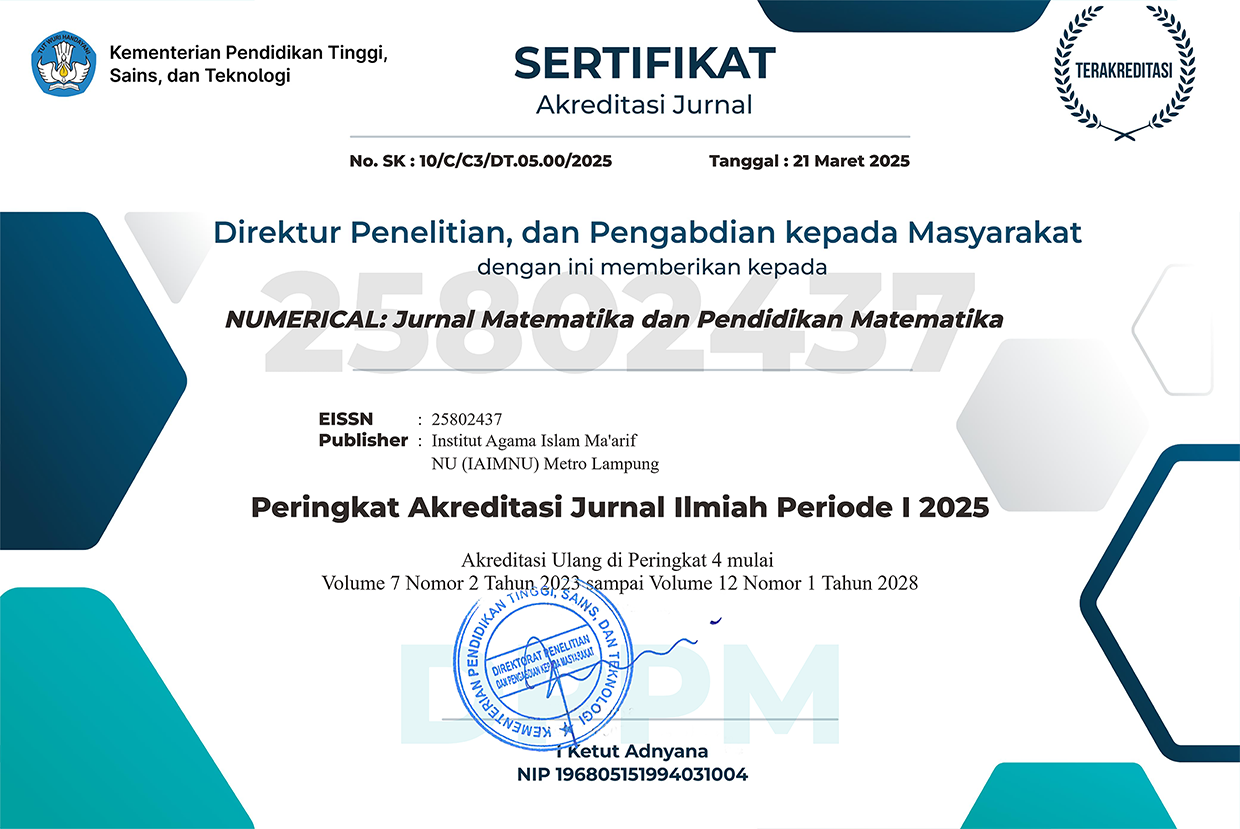Learning Motivation Viewed from Goal Orientation, Self-Confidence Control, Test Anxiety and Student Assignment Value
DOI:
https://doi.org/10.25217/numerical.v7i2.3878Keywords:
Goal Orientation, Learning Motivation, Self-Confidence Control, Student Assignment Value, Test AnxietyAbstract
Students’ confidence will be more curious, willing to try new things, and take chances. Self-confidence is a state of mind where a person feels confident in his ability to carry out various tasks and dares to voice his opinion in front of others. The importance of students' work as a learning outcome depends on their level of self-confidence. This study aims to determine whether there is a significant influence between learning motivation and learning outcomes in mathematics. This study uses a quantitative approach using regression analysis. The population in this study were all grade 9 students at SMPN 11 Pasuruan City, while the sample in this research was 118 grade 9 students. The sampling technique used was random sampling. Learning motivation data was collected through a learning motivation questionnaire while learning outcomes data was taken from UAS score data at the school. The data was then analyzed using the t-test. The results showed a significant influence between learning motivation and students' mathematics learning outcomes. The study results prove that goal orientation, control beliefs, and bag anxiety strongly influence the value of the task; therefore, to foster a self-confident attitude, students must have a target score or grade to achieve. These three things influence students' learning motivation to influence the value of assignments. The motivation to learn mathematics in class IX of SMP Negeri 11 Pasuruan City.
References
W. A. Prasetya, I. I. W. Suwatra, and L. P. P. Mahadewi, “Pengembangan Video Animasi Pembelajaran Pada Mata Pelajaran Matematika,” Jurnal Penelitian dan Pengembangan Pendidikan, vol. 5, no. 1, 2021.
S. Wulandari, “Media Pembelajaran Interaktif Untuk Meningkatkan Minat Siswa Belajar Matematika Di SMP 1 Bukit Sundi,” Indonesian Journal of Technology, Informatics and Science (IJTIS), vol. 1, no. 2, 2020, doi: 10.24176/ijtis.v1i2.4891. DOI: https://doi.org/10.24176/ijtis.v1i2.4891
N. Susanti, “Kebijakan Peningkatan Kualitas Pendidikan di Indonesia,” Al-Kahfi : Jurnal Pendidikan Agama Islam, vol. 5, no. 1, pp. 128–141, 2020.
S. Abramovich, A. Z. Grinshpan, and D. L. Milligan, “Teaching Mathematics through Concept Motivation and Action Learning,” Education Research International, Apr. 2019, doi: https://doi.org/10.1155/2019/3745406.
W. Admiraal, W. Schenke, L. De Jong, Y. Emmelot, and H. Sligte, “Schools as professional learning communities: what can schools do to support professional development of their teachers?,” Professional Development in Education, vol. 47, no. 4, pp. 684–698, Aug. 2021, doi: 10.1080/19415257.2019.1665573. DOI: https://doi.org/10.1080/19415257.2019.1665573
A. Alhamuddin, D. N. Inten, D. Mulyani, and R. D. Erlangga, “21st Century Learning: Strategies and Competencies,” Advances in Social Science, Education and Humanities Research, vol. 658, pp. 332–337, 2022.
S. Yan and Y. Yang, “Education Informatization 2.0 in China: Motivation, Framework, and Vision,” ECNU Review of Education, vol. 4, no. 2, pp. 410–428, 2021, doi: 10.1177/2096531120944929. DOI: https://doi.org/10.1177/2096531120944929
I. Kusmaryono, A. M. Gufron, and A. Rusdiantoro, “Effectiveness of Scaffolding Strategies in Learning Against Decrease in Mathematics Anxiety Level,” Numerical: Jurnal Matematika dan Pendidikan Matematika, vol. 4, pp. 13–22, 2020, doi: 10.25217/numerical.v4i1.770. DOI: https://doi.org/10.25217/numerical.v4i1.770
P. Hatta, Y. H. Aristyagama, R. A. Yuana, and S. Yulisetiani, “Active Learning Strategies in Synchronous Online Learning for Elementary School Students,” IJIE (Indonesian Journal of Informatics Education), vol. 4, no. 2, pp. 86–93, Mar. 2021, doi: 10.20961/ijie.v4i2.46019. DOI: https://doi.org/10.20961/ijie.v4i2.46019
A. Downton, K. Giumelli, B. McHugh, and P. Stenning, “Impact of teachers’ professional learning on students’ learning of multiplicative thinking,” Math Ed Res J, Mar. 2022, doi: 10.1007/s13394-021-00408-4. DOI: https://doi.org/10.1007/s13394-021-00408-4
A. D. Susandi, “Critical Thinking Skills of Students in Solving Mathematical Problem,” Numerical: Jurnal Matematika dan Pendidikan Matematika, vol. 5, pp. 115–128, 2021, doi: 10.25217/numerical.v5i2.1865. DOI: https://doi.org/10.25217/numerical.v5i2.1865
D. Feny Rita Fiantika, Metodologi Penelitian Kualitatif. In Metodologi Penelitian Kualitatif, no. Maret. 2022.
R. Candra Puspita, “Analisis Learning Orientation Terhadap Marketing Performance Melalui Innovation Sebagai Variable Intervening (Studi Kasus Pada Green Product UMKM di Ponorogo),” no. 2021.
E. Agustina and S. Yuliyana, “Kontrol diri dan dukungan teman sebaya dengan coping stress pada remaja,” 2017.
S. Patty, S. Wijono, and A. Setiawan, “Hubungan Dukungan Sosial Teman Sebaya, Kontrol Diri, Dan Jenis Kelamin Dengan Prestasi Belajar Siswa Di Sma Kristen Ypkpm Ambon,” Psikodimensia, vol. 15, no. 2, p. 204, 2017, doi: 10.24167/psiko.v15i2.989. DOI: https://doi.org/10.24167/psiko.v15i2.989
C. Novtiar and U. Aripin, “Dan Kepercayaan Diri Siswa Smp Melalui,” Jurnal Prisma Universitas Suryakancana, vol. VI, no. 2, p. 121, 2017.
Nurlaela and Sugiyanto, “Pengaruh Kinerja Dosen dan Kualitas Layanan Administrasi Akademik terhadap Kepuasan Mahasiswa Dampaknya terhadap Prestasi Belajar di Universitas Pamulang Tangerang Selatan,” Prosiding Seminar Nasional Humanis 2019, 2019.
S. Abramovich, A. Z. Grinshpan, and D. L. Milligan, “Teaching Mathematics through Concept Motivation and Action Learning,” Education Research International, vol. 2019, p. e3745406, Apr. 2019, doi: https://doi.org/10.1155/2019/3745406. DOI: https://doi.org/10.1155/2019/3745406
M. M. Baguley, Y. S. Findlay, and M. C. Kerby, Meanings and Motivation in Education Research. Routledge, 2015. DOI: https://doi.org/10.4324/9781315749631
E. Baten, S. Pixner, and A. Desoete, “Motivational and Math Anxiety Perspective for Mathematical Learning and Learning Difficulties,” in International Handbook of Mathematical Learning Difficulties, A. Fritz, V. G. Haase, and P. Räsänen, Eds., Cham: Springer International Publishing, 2019, pp. 457–467. doi: 10.1007/978-3-319-97148-3_28. DOI: https://doi.org/10.1007/978-3-319-97148-3_28
Z. Fajri, H. Baharun, C. Muali, Shofiatun, L. Farida, and Y. Wahyuningtiyas, “Student’s Learning Motivation and Interest; The Effectiveness of Online Learning during COVID-19 Pandemic,” Journal of Physics: Conference Series, vol. 1899, p. 012178, May 2021, doi: 10.1088/1742-6596/1899/1/012178. DOI: https://doi.org/10.1088/1742-6596/1899/1/012178
Downloads
Published
How to Cite
Issue
Section
License
Copyright (c) 2023 Muhammad Rafli Faishal, Akhsanil In’am, Zukhurufurrohmah

This work is licensed under a Creative Commons Attribution-ShareAlike 4.0 International License.











